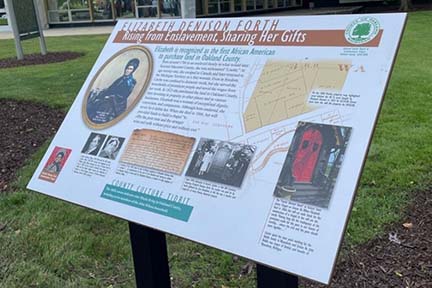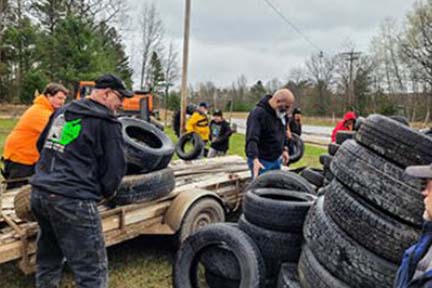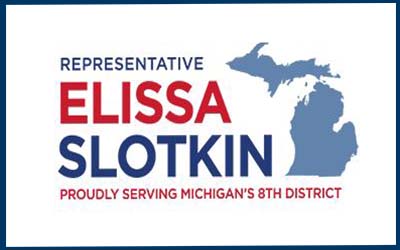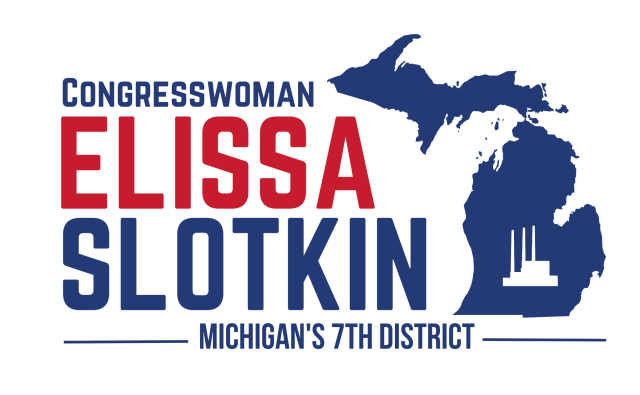
OC Celebrates Juneteenth: Honoring Woman Born into Slavery
Oakland County Celebrates Juneteenth by Honoring Woman Born into Slavery Who Became First Black Woman to Own Property in Michigan
Pontiac, Michigan – Oakland County dedicated a historical plaque honoring Elizabeth Denison Forth, the first woman of color to own property in Oakland County and the territory of Michigan, in front of the Sixth Circuit Court Building in Pontiac in celebration of Juneteenth, a holiday that commemorates the official end of slavery in the United States. During the ceremony Wednesday, participants also raised the Juneteenth flag at the courthouse.
“Juneteenth is a cause for celebration and reflection for all of our residents. It marks a day that is especially meaningful for the black community, but also is a moment of history that all of us can both observe and remember as the official end of the dark chapter of slavery in America’s history,” said Oakland County Executive Dave Coulter. “That’s why the county officially made Juneteenth a holiday last year, why the county offices will be closed on June 19, and why we held a grand and festive celebration today to commemorate that momentous day. In honor of Juneteenth and every day, we dedicate ourselves to freedom from discrimination, violence, and unequal treatment.”
Coulter joined other county officials at the county’s first Juneteenth festivity including Oakland County Board of Commissioners Vice Chairwoman Marcia Gershenson, County Commissioner Angela Powell of Pontiac, and Chief Diversity, Equity, & Inclusion Officer Harry Weaver. Zach Zuchowicz, DEI and community engagement coordinator for Oakland County Parks and Recreation, announced free admission at Oakland County Parks on Monday, June 19, the official Juneteenth. County offices will also be closed that day in observance of the holiday.
“It’s important that people see that a woman, a Black former slave, is being recognized in our county and in the larger community,” Powell said. “This sign outside of the courthouse is just another reminder of where we’ve come from, and the potential we all have when we work together.”
The Oakland County Board of Commissioners spearheaded an effort to honor Forth in February 2022 with a resolution dedicating funds to a permanent marker. With the input of local historians and enthusiasts from around the county, the installation serves as a reminder of the county’s collective and inspiring history.
Forth was born into slavery in 1786. According to the Michigan Women Forward website, she won her freedom by escaping with one of her brothers to Canada after a court ruling by the Michigan Territory Supreme Court in 1807 which stated that escaped slaves who established their freedom in Canada could not be returned to slavery upon return to the United States. She returned to Detroit a free woman by working as a domestic servant in Solomon Sibley’s household, the first Mayor of Detroit.
In 1825, Forth purchased 48 acres of land in Pontiac, which today forms part of Oak Hill Cemetery, making her the first African American and one of the first women to own property in the (Michigan) territory. Never living on the property, she leased it to her brother for farming. She also invested money in the first steamboat built in the upper lakes, Walk-in-the-Water, and Detroit’s Farmers and Mechanics Bank. After her death in 1866, she left a portion of her estate for the building of St. James Episcopal Church on Grosse Ile, which remains an active congregation today. She is buried in Elmwood Cemetery in Detroit.
Oakland County’s first Juneteenth event also featured performances by storytellers Baba O and Nanou Djiapo, an African drum and dance group from Metro Detroit.




 Attendees said the volunteer experience produced a mix of emotions.
Attendees said the volunteer experience produced a mix of emotions.
 Anyone interested in organizing a cleanup can start by checking out the
Anyone interested in organizing a cleanup can start by checking out the  If something is still usable, such as clothing, it can be donated to a charitable organization. Organic matter, such as live Christmas trees, can be sent to community composting sites.
If something is still usable, such as clothing, it can be donated to a charitable organization. Organic matter, such as live Christmas trees, can be sent to community composting sites.








